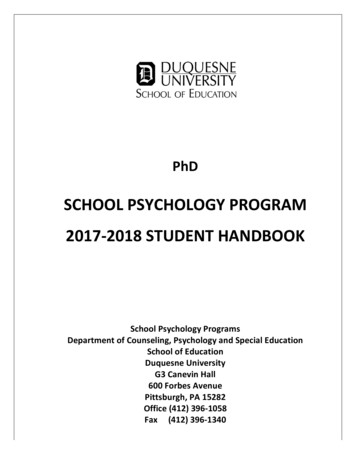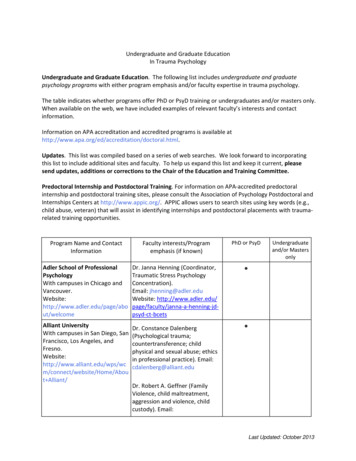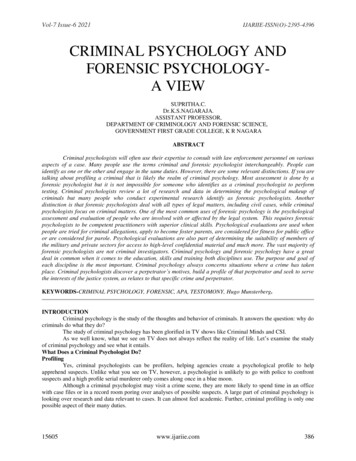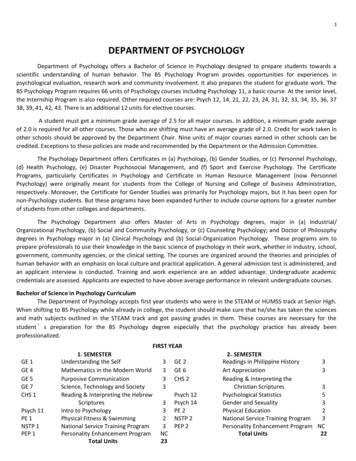
Transcription
Department of Psychology Graduate Program HandbookCONTENTSI. Three Levels of Authority and InformationII. Admission to the DepartmentIII. Advisers and Changing AdvisersIV. Master's ProgramsV. Ph.D. ProgramVI. Guidelines for Evaluating Graduate StudentsVII Returning Graduate Students (Two Year Rule)VIII Guidelines for the Appointment of Graduate Associates in the Department of PsychologyIX Stipend Guidelines for Graduate Teaching AssociatesI. Three Levels of Authority and InformationA. The Graduate School and the Graduate School HandbookThe Graduate School of The Ohio State University publishes the Graduate School Handbook whichprovides the official rules governing all graduate students at the University. Thus, it is very important thatgraduate students in the Department of Psychology have a copy and be familiar with its contents. Copiescan be obtained at the Graduate School. The Graduate School Handbook covers all rules and regulationsconcerning matters of registration, scheduling, course credit, academic standards degree requirements, andpetitions. It should be considered the first source of information regarding all such rules, policies, andprocedures.B. The Psychology Department and the Graduate Studies CommitteeAs the Graduate School Handbook states, academic units such as the Psychology Department areauthorized to define additional rules and policies about graduate programs, as long as the rules of theGraduate School are satisfied. Therefore, graduate students in the Psychology Department are subject to anumber of additional rules and policies not stated in the Graduate School Handbook. The purpose of thepresent handbook is to specify these additional rules and policies and to call the student's attention toespecially important aspects of the rules presented in the Graduate School Handbook. It also will describeprocedures to follow and forms to file when a student reaches a transition point in his or her graduateeducation.Within the Department of Psychology, there is a Graduate Studies Committee (GSC). As described in theGraduate School Handbook, the GSC oversees and administers the graduate program offered by theDepartment, and serves as liaison between the Graduate School and the Department. The GSC inPsychology consists of a representative from each of the currently recognized program areas of theDepartment. The department chair appoints the chairperson of the Graduate Studies Committee on anannual basis. Each area selects its own representative for a three-year term. The decisions of the GSC aresubject to review by the Department.When a graduate student in Psychology confronts a question or problem relating to Graduate School rulesand policies, the student can attempt to obtain information or help from the student's adviser, theDepartment's Graduate Studies Office, the Chairperson of the Graduate Studies Committee, or the GraduateSchool Staff, whichever seems most appropriate. When a student believes that circumstances warrant awaiver of a Graduate School rule, the student, after consultation with the adviser, may submit a petition tothe Graduate School. The petition must be directed through the Chair of the GSC who consults the student'sadviser. Specific procedures are provided in the Graduate School Handbook.
C. Areas Within the Psychology DepartmentGraduate students in Psychology also should be aware that the rules described in the Graduate SchoolHandbook and this document are minimum requirements of the Department of Psychology. Areas ofspecialization within the Department may establish additional requirements, such as mandatory courses,minor areas, etc. Thus, each student should be familiar with any such additional requirements defined bythe faculty of the student's area. (Students should note that the term "areas" also is used in the GraduateSchool Handbook, since the colleges and departments within the Graduate School are organized into tengroups, or areas, for administrative purposes. Thus, "areas" in the Graduate School means somethingdifferent from "areas" within the Psychology Department.)II. Admission to the DepartmentAdmission to the Department ordinarily is for Autumn Semester only and is decided by the AdmissionsCommittee in the preceding Spring Semester. The Graduate School ) and the Department of Psychology (http://www.psy.ohio-state.edu/graduate/) websitesshould be consulted for current admission requirements. Completed applications should be received byDecember 15, or December 1 for the Clinical and Cognitive programs. The Department submits itsFellowship nominees to the Graduate School by very early February. Applicants whose materials arereceived after February 1 have much less likelihood of being admitted as most decisions will be made priorto that date. The Graduate Record Examination should be taken in October or earlier to ensure timelyreceipt of the scores by the Department.For information regarding admissions writeGraduate Studies OfficeDepartment of PsychologyThe Ohio State University1835 Neil Avenue MallColumbus, Ohio 43210-1222(Phone: 614-292-4112)III. Advisers and Changing AdvisersAt the time of matriculation, each area will notify the departmental Graduate Office of designated advisorsfor graduate students admitted into their area. If a student wishes to change advisers, this matter should bediscussed with both the old and new adviser. Once a change has been agreed upon, it can be formallyaccomplished by notifying the Psychology Graduate Program Office.IV. Master's ProgramsRequirements for a Master's degree are specified in the Graduate School Handbook. Points of specialimportance, and additional rules pertaining to the Psychology Department are specified here.A. Thesis RequirementThe Psychology Department employs the Thesis Plan described in Section VI.1 of the Graduate SchoolHandbook. That is, a thesis is required in order for a Master's degree to be obtained.B. Thesis Research Credit HoursNormally thesis research credit for the Master's degree (i.e., credit for Psychology 8999) shall not exceed20 credit hours.C. The Master's Examination CommitteeThe Master's Examination Committee is comprised of at least three faculty members including the adviser(the Graduate School Handbook requires only two). At least two of the three, including the student'sadviser, who serves as chairperson, must hold graduate faculty rank in Psychology. The third committeemember need not be from the Psychology Department, but must be a member of the graduate faculty. The
adviser must be at least Category M Graduate Faculty; remaining committee members must be at leastCategory M. Other faculty members and graduate students may attend the oral examination by invitation ofthe candidate and the Master's Examination committee. Invitations are extended only with the unanimousapproval of the candidate and the members of the committee. The examination is oral, approximately onehour in length, and does not include a written portion. At the conclusion of the exam the committee has tworesponsibilities: (1) It accepts or rejects the thesis and judges the examination satisfactory or unsatisfactory.This decision is transmitted to the Graduate School on a form which it provides. A copy of the form shouldbe sent to the GSC for departmental records. (2) It recommends to the GSC whether the students may ormay not continue in the Ph.D. program.Forms: 1. Application to Graduate: Master’s Degree2. Master’s Examination Report3. Master’s Thesis Approval4. Status Beyond: Transfer of Excess Credits5. Recommendation for Continuation (departmental form)D. TimingThe entire work for the Master's degree is normally completed by the end of the second year.E. Form: Application to GraduateNo later than the third Friday of the semester in which a student intends to receive the Master's degree, thestudent must file an Application to Graduate-Master's Degree (Appendix C).F. Form: Transfer of Credit to Ph.D. ProgramDuring the first semester of registration following receipt of the Master's degree, a student must file withthe Graduate School the form shown in Appendix D. This form requests that credit hours in excess of the30 needed for the Master's degree be transferred to the Ph.D. program.G. Form: Transfer of Credit from Another UniversityStudents entering the Department of Psychology at Ohio State with a Master's Degree already obtainedfrom another university are assumed to be admitted to a Ph.D. program unless otherwise stipulated by thestudent's major area. Such students should file with the Graduate School the form shown in Appendix F, onwhich 30 hours of credit can be requested for the Master's degree plus additional hours as appropriate (seeGraduate School Rules II 3.2.3 and II 6.6.2). This form should be completed by the student and brought tothe GSC chairperson along with a transcript showing evidence of the Master's degree from the otherinstitution and a note from the adviser indicating the credit to be transferred.H. Form: Recommendation for ContinuationI. Bypassing the Master's DegreeThe Master's degree is ordinarily completed by all students in the Ph.D. Program. The PsychologyDepartment requires that a student receive approval from their advisor in order to receive the Ph.D. withoutthe MA. In such cases, the department requires the student to submit and be examined on a research paperwhich is approved as equivalent to a Master's thesis by three graduate faculty members of the Departmentincluding the adviser. Written notification of such approval should be sent by the adviser to the Chairpersonof the GSC along with (1) the recommendation regarding the student's continuation 'in the Ph.D. Program,(see Appendix E) and (2) a copy of the research paper which will be kept in the permanent file of the GSC.This rule also applies to students whose Master's degrees from other departments or universities did notrequire a thesis.
V. Ph.D. ProgramRequirements for a Ph.D. degree are specified in the Graduate School Handbook. Points of specialimportance, and additional rules pertaining to the Psychology Department are specified here.A. Curriculum RequirementsStatistics Requirement. All graduate students are required to take the two courses in the departmental corestatistics sequence (currently, Psych 6810 and 6811). The basic statistics requirement should be completedprior to the completion of a master’s thesis.Primary Area of Concentration. All doctoral students must complete the course curriculum requirementsspecified by their area of concentration within the Psychology graduate program. At present, the designatedareas of concentration are Clinical, Cognitive, Developmental, Behavioral Neuroscience, Quantitative,Social, and Intellectual and Developmental Disabilities (I/DD). (Note: Designated areas could be added ordeleted by future decisions at the departmental level.) Area program faculty are responsible for specifying aset of courses (or course options) that are required for completion of a doctoral major in that area, includinga set of at least 3 courses in that area of specialization. Area curricula (and any changes to curriculumrequirements) are reviewed and approved the departmental graduate studies committee. Area curriculumrequirements must be provided in writing to all entering graduate students at the time of their enrollment inthe program.Breadth requirement. Each area should include in their curriculum specifications a requirement for someminimum number of courses (at least two) outside the student’s area of concentration (these could becourses in other areas of Psychology or in other departments). (Note: the basic statistics sequence does notcount toward this breadth requirement.) Each area is responsible for providing graduate level courses intheir course offerings that are accessible to doctoral students outside that area for purposes of meeting thisbreadth requirement.Flexibility requirement. The curriculum requirements specified by each area should be sufficiently flexibleto allow the possibility for students to pursue a subspecialty that crosses areas (e.g., social-neuroscience,cognitive-neuroscience, developmental-neuroscience, health psychology, JDM). Such subspecializationsshould not replace the area of concentration requirement, but should be something that a student cancomplete as an extension or addition to their major area.Research Ethics. Areas are responsible for incorporating into their doctoral program curriculum adequatecoverage of principles, guidelines, policies, and practices regarding scientific conduct, ethical treatment ofresearch participants and data, and other professional ethics relevant to their area of specialization inpsychology. In addition to attention to ethical issues as part of ongoing research training and experience,each area should have some formal training in research ethics either incorporated as part of a requiredcourse (or courses) or as part of a regular series of seminars, brownbags, or discussion groups that areattended by all graduate students in the program. The ethics sessions should be offered frequently enoughthat they are part of the first two-year curriculum for every graduate student in the program.B. Secondary ConcentrationsIn addition to a primary area of concentration, a graduate student may have a secondary area ofconcentration. Some areas within the Department require a secondary concentration although theDepartment does not. Students in other areas may choose to have a secondary concentration. Theconcentration may be another area within Psychology, or may be outside of the Department. Each areamay designate requirements for a secondary concentration, which must be met by students wishing tocomplete that area’s secondary concentration. For example, the requirements for a secondary concentrationin Quantitative Psychology are given below.Requirements for a Secondary Concentration in Quantitative Psychology: A student wishing to completea minor in quantitative psychology must complete a sequence of five courses in the program. These mustinclude the two courses in the first-year statistics sequence (Psych 6810 and 6811) and three additionalcourses. In addition, each student must meet one of the following criteria:1. A grade point average of at least 3.50 in the five courses. OR2. Successful completion of a written secondary concentration exam. The format of the exam, andthe criteria for passing are determined by the faculty of the quantitative psychology program.
C. ResidencyGraduate students should be especially aware of the residency requirements specified in Section VII.14 ofthe Graduate School Handbook. These requirements are designed to ensure a concentrated period of studyin the major program. Failure to meet these requirements can cause serious difficulties or delays ingraduation.D. Candidacy ExaminationsRequirements for candidacy examinations are provided in Sections VII.4 – VII.8 of the Graduate SchoolHandbook. Further rules and policies relevant to Psychology students are as follows:1. The Candidacy Examination Committee: The Graduate School Handbook provides rules regardingmembership on the Candidacy Examination Committee. For Psychology students, at least three of the fourmembers of the committee must hold the necessary graduate faculty status in the Department ofPsychology. The adviser must be Category P; other members at least Category M. Also, it is deemedadvisable that one member of the committee be from a department or departmental area outside thestudent's major area. The candidacy exam includes evaluation of both the written and oral portions of thestudent’s exam. According to policy set by the Graduate School, a unanimous decision on the part of themembers of the examination committee is required for passing the exam.2. Area Requirements: Within the guidelines defined in the Graduate School Handbook, each area withinthe Department determines its own procedures and rules regarding the written portion of the CandidacyExamination. Therefore, each graduate student should become familiar at an early date with the CandidacyExamination procedures followed by his/her area.3. Form: Notification of Candidacy Examination: Prior to beginning the written portion of the Candidacyexamination, the student should obtain and complete, with the adviser's assistance, the "Notification ofCandidacy Examination" form. Instructions are printed on the back of this form. A specified portion of theform is to be submitted by the student to the Graduate School prior to beginning the written exam. Theremainder of the form is to be submitted by the student at least two weeks prior to the oral exam. In cases inwhich a student is taking a second candidacy exam, the Dean of the Graduate School will appoint theGraduate School Representative. In such cases, the student is responsible for providing a copy of thewritten exam to the Graduate School Representative at least one week prior to the oral exam.4. Timing: Students are required to earn their PhD within 5 years of successfully passing candidacy.E. DissertationThe dissertation is a contribution to knowledge in which independent scholarship is necessary. SectionsVII.9 – VI.12 of the Graduate School Handbook present rules regarding the dissertation and final oralexamination. Additional matters relevant to Psychology students are presented here.1. The Dissertation CommitteeA problem and method of approach to the dissertation are determined by the student in collaboration withhis/her adviser, who must hold Category P graduate faculty status. Category M faculty may serve as coadvisers. When a proposal has been developed, a Dissertation Committee consisting of the adviser and atleast two other category M or P graduate faculty members is determined. At least three members (includingthe adviser) of this committee must be from the Department of Psychology. This committee has twofunctions:a) to discuss the student's proposal at the outset, recommending changes for the student'sconsideration; ANDb) to serve as readers for the final dissertation and members of the Final Oral ExaminationCommittee.2. Form: Application to GraduateNo later than the third Friday of the semester in which the student expects to receive the Ph.D., the studentmust file the Application To Graduate: Doctoral Degree (Appendix H).
3. Form: Draft ApprovalWhen a draft of the dissertation is completed, a copy is provided to each member of the DissertationCommittee by the student. Not less than two weeks later, the student can obtain signatures of committeemembers on the Draft Approval Form and can submit this form to the Graduate School, along with a draftof the dissertation. This form also serves to schedule the final oral examination. The form must besubmitted by the student at least two weeks prior to the final oral examination, and the final oralexamination must be completed at least two weeks prior to commencement. In order to meet this sequenceof deadlines, a student should circulate a draft of the dissertation to the committee by the end of the seventhweek of the semester in which the student has filed an Application to Graduate.F. Final Oral Examination1. Attendance at the Final Oral Examination. Other faculty members in addition to the committee mayattend and participate in the oral examination by invitation of the Candidate and the Final Oral ExaminationCommittee. In addition, other graduate students may attend the oral examination by invitation of theCandidate and the Final Oral Examination Committee. Invitations are extended only with the unanimousapproval of the Candidate and the members of the Final Oral Examination Committee, with the exceptionof the Graduate School Representative, whose approval is not required.2. Satisfactory Performance on the Final Examination: The Graduate School Handbook specifies that aunanimous decision is required for the student to be deemed to have passed the Final Oral Examination.VI. Guidelines for Evaluating Graduate StudentsA. GeneralBecause of the nature of graduate studies, it is assumed that the informal evaluation of a student's progresstoward a degree will take place on a regular and recurring basis throughout his or her graduate career.Moreover, it is expected that students will be kept informed of such assessments as a result of discussionsbetween the student and faculty (especially the major adviser) over the course of their interactions.Nonetheless, it is the policy of the Department that each student be given a formal, written evaluation on anannual basis.It is the responsibility of each program area of the department to define and implement its evaluationprocess. The guidelines presented in this section outline the general nature and implications of such anevaluation and describe minimal levels of compliance to the Department policy in this area. Program areasmay establish additional rules and procedures for the formal evaluations of its students.B. Rules and Procedures for Evaluating Students1. The Focus. The focus of the formal review will be on: (a) evaluation of the student's rate of progresstoward achieving a graduate degree; (b) an assessment of the students strengths and weaknesses; and (c) thedetermination of the student's status in the program. The evaluation will provide an opportunity torecognize excellence or to clearly communicate to the student that he or she is not meeting expectations ofthe program.2. Roles and Responsibilities. Program areas must specify the roles and responsibilities of each of theparties to student evaluations: the student, the adviser, and the area faculty.3. Timing. Each student shall be evaluated formally at least once a year.4. The Domain of the Evaluation. The factors to be considered in the conduct of student evaluation must beclearly specified by the area. In general, these would reflect the program area's expectations for aPsychologist-in-training, such as the timeliness of the student's progress, and the student's behavior orperformance in the areas of research, course work, ethics, service to the department, and professionaldevelopment.
5. The Standards Used. Program areas will define the levels of functioning expected of students withrespect to the domains of evaluation, including the criteria for warning a student or for denying a studentfurther registration.6. The Uses of the Evaluation. There are at least two potential purposes of evaluations: "development" and" administrative action." In the case of the former, the goal is to use the information to guide efforts atimprovement. In the latter, evaluations can be used for such administrative decisions as student retentionand financial support. While the annual evaluation will serve as a basis for administrative decisions (asoutlined in section 8, below), it is the responsibility of the program area to be specific with regard to all theproposed uses of the yearly evaluations.7. Notification and Access. It is important for program areas to specify how the evaluation will becommunicated to the student. Program areas also must specify who has access to student evaluations andthe procedures involved in granting access.8. Lack of Reasonable Progress/Warning. Area discretion notwithstanding, the formal student evaluationshould be used to establish that a student is not making reasonable progress toward a degree, when thestudent should be sent a lack-of-progress warning, or when the student is to be terminated from theprogram. In so doing, the program area must specify the terms and conditions to be met by the student.That is to say, program practices must be explicit with regard to the following:a. The criteria to be used for determining that a student is not making reasonable progress.b. How a student is to be informed (warned) that he or she is not making reasonable progress.c. The necessary steps to be taken by a student who has been warned in order to return to goodstanding in the program.d. The penalties/implications for being on warning status.e. The penalties for not meeting the conditions for returning to good standing (e.g the denial offurther registration).9. Appeals. The following actions, if taken as a result of the formal evaluation by a program area, areappealable: making a determination that a student is not making reasonable progress; issuing a lack ofprogress warning to a student; not returning a student to good standing; denying financial support to astudent as a result of a negative evaluation; or denying further registration in the area. The area's appealsprocess should be designed so as to be consistent with the departmental grievance procedure outlinedbelow.10. Grievance Procedure. Graduate students in Psychology having grievances related to area evaluationsare encouraged to discuss the problem informally first (see a. below) and, if the grievance is not resolvedsatisfactorily, to present the grievance formally to the Chair of the Department (see b. below). If thegrievance is not resolved satisfactorily under this departmental procedure, it may then be addressed to theDean of the Graduate School (see c. below).a. Informal discussions concerning the nature of the complaint should be held with any of theseindividuals as deemed pertinent by the student: graduate adviser, area coordinator, arearepresentative on the Ethics Committee, Ethics Committee Chair and /or Department Chair. Ifthese informal discussions are unsatisfactory from the student's viewpoint and do not resolve thegrievance, the student may request a formal hearing by submitting such a request in writing, to theDepartmental Chair.b. Upon receipt of a written request for a grievance hearing, including a statement of the nature ofthe complaint, the Chair of the Department will appoint a Hearing Panel consisting of fivemembers-- two faculty members from outside the student's area of study, (and also not membersof the Ethics Committee), two graduate students from outside the student's area of study, and the
Departmental Chair serving as chair of the panel. The panel should have a meeting within oneweek of the receipt of the complaint and should request information from the student and theadviser, area coordinator, and Ethics Committee members as needed. Each party may make apresentation in person or writing, and is entitled to representation, and may call witnesses on his orher behalf. Each hearing panel will decide by majority vote its rules of procedure such as crossexamination and its rules of evidence. After gathering information, the panel will meet in closedsession to decide on the validity of the grievance and to direct a resolution. A written report of thedecision and the resolution should be furnished to all parties as soon after the hearing as possible.c. A student who considers the resolution of the grievances to be unsatisfactory may present thegrievance to the Dean of the Graduate School according to Graduate School guidelines.11. Coordination with the Graduate School. The program area's evaluation process must be consistent withthe policies of the Graduate School. In particular, the formal warning of students or the denying ofregistration can be done only through the Graduate School and involves the Chair of the Graduate StudiesCommittee. Thus, while the process of imposing sanction will be initiated by the area, these two partiesmust be involved for a warning to be official.12. Documentation of Program Area Practices. Each area's policies and procedures for student evaluationmust be consistent with the Department policy set forth in this section. The Graduate Studies Committee isresponsible for monitoring that policies and procedures of each area are in compliance with thesedepartment policies.13. Distribution of Student Evaluation Policy and Practices Document. All faculty and students in aprogram area will receive a copy of the area's evaluation policy and practices document. It is recommendedthat this be done at the time individuals join a given program. The Graduate Studies Committee of thedepartment will maintain a current set of such documents as will the Department Chair.VII. Returning Graduate Students (Two Year Rule)Enrollment eligibility for a pre-candidacy doctoral student who has not registered in the Graduate Schoolwithin the preceding two full calendar years will be automatically deactivated. Eligibility for doctoralstudents who have passed the Candidacy Examination is automatically deactivated at the end of the fiveyear candidacy period if they have not graduated by then. To reenroll, the student must petition the GSC forreactivation. Following consultation with the student's adviser or area, if the petition is approved, the GSCChairperson submits a form to reactivate the student to the Graduate School.VIII. Guidelines for the Appointment of Graduate Associates in the Department of PsychologyA. Graduate School GuidelinesGraduate School rules and information related to GA appointments are in the Graduate School Handbook(Section IX, "Graduate Associates"). Graduate students are responsible for being aware of all current rules,but some of the highlights are listed below:1. Policy concerning length and extent of appointments is to be formulated by the department.Appointments are for 50 percent of full time. Short-term appointments (one semester) should be avoidedwhen possible, and students holding short-term appointments should be considered for full appointmentsfor the following academic year.2. Consistent with the availability of planning information, appointments and reappointments should beannounced as early as possible in Spring Semester, but no later than two weeks after the Board of Trusteesapproves the University Budget.3. The usual 50 percent appointment is considered to entail an average of 20 hours per week of service.
4. Adequate facilities for fulfilling the GA responsibilities, including office or laboratory space and other
The Graduate School of The Ohio State University publishes the Graduate School Handbook which provides the official rules governing all graduate students at the University. Thus, it is very important that graduate students in the Department of Psychology have a copy and be familiar with its contents. Copies can be obtained at the Graduate School.










